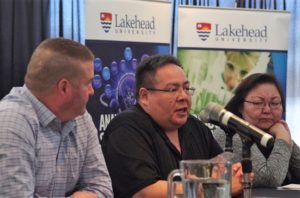Indigenous institutions look to build and strengthen relationships

By Rick Garrick
THUNDER BAY—Anishinabek Educational Institute’s (AEI) Education Director Murray Waboose stressed the importance of building relationships with Indigenous institutions during Lakehead University’s Strengthening Partnerships with Northern Aboriginal Institutes panel and roundtable discussion on March 6.
Waboose was one of three education leaders from across northern Ontario who spoke during the roundtable during Research and Innovation Week.
“With the recruitment of a new president, I am sure they (Lakehead University) will be looking at how the new president’s role will look at developing new partnerships with Indigenous institutions,” says Waboose, noting that former Lakehead University president Brian Stevenson stepped down at the end of 2017. “So I think that will be a key area of responsibility for the new incoming president.”
Waboose also noted how two recent agreements with the federal and provincial government will benefit Anishinabek students from 23 of the 40 Anishinabek Nation First Nations in the future. The 23 Participating First Nations signed the Anishinabek Nation Education Agreement with the federal government and the complementary Master Education Agreement with the provincial government in August 2017.
“It will certainly change the landscape of how…our Anishinabek students are getting the services with our relationship with the school boards,” Waboose says. “It is also going to enhance the level of services and also the collaboration with those school boards to ensure we are meeting the needs of our Anishinabek students.”
Rosie Mosquito, executive director of Oshki-Pimache-O-Win: The Wenjack Education Institute, and Brent Tookenay, CEO of Seven Generations Education Institute, also spoke about partnerships during the roundtable.
“I think this event is really helpful [and] I think it is informative for the community here at the university,” Mosquito says. “But one of the messages I wanted to impart before I left is that when you talk about research and innovation, I wanted to encourage the leadership here at Lakehead University to open their minds to doing business in new and innovative ways and innovative ways to look at fair and equitable partnerships.”
Mosquito says the Aboriginal Institutes have not had access to operational or core funding for the programming they provide to students.
“We’ve operated on shoestring budgets and a lot of time and energy and ingenuity involved in patching funding together to offer our programs,” Mosquito says.
Tookenay says that trust is the most important aspect in the development of partnerships.
“There has to be that trust there with a common goal and a common understanding of what we want to accomplish with the partnership,” Tookenay says. “With the history of our First Nation communities, there hasn’t always been that trust in the education system, and that is a barrier that not only our institutes have to overcome and build up that confidence in our communities, but for mainstream institutes as well. So from our perspective, and from my perspective, that trust in that relationship is the most important thing in a partnership. And a partnership has to be a fair partnership.”
The roundtable was held to explore the rich history of the Indigenous institutes and how Lakehead University can strengthen partnerships and research opportunities with the Indigenous institutes.
“Some of the key points were when they talked about the importance of building trusting relationships, fair and equitable relationships,” says Denise Baxter, vice-provost (Aboriginal Initiatives) at Lakehead University. “I think a really important piece we heard today was around the fair partnerships and the reciprocity that happens within each of the partners.”
Baxter moderated the roundtable, which was held in the Faculty Lounge.


